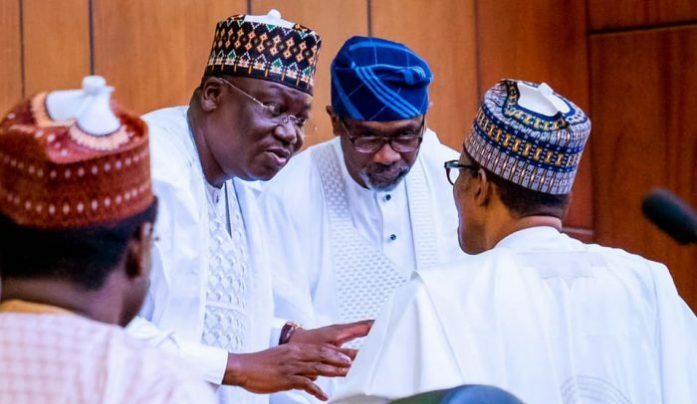Government can be more responsive
Millions of Nigerians are today facing serious hardships from a multitude of sources as evident in the simultaneous collapse of critical utilities and rising inflation in recent months. The scarcity of Premium Motor Spirit (PMS), otherwise known as petrol, which had set in since early January, has persisted more than two months on. This has […]

Buhari with Senate and House
Millions of Nigerians are today facing serious hardships from a multitude of sources as evident in the simultaneous collapse of critical utilities and rising inflation in recent months. The scarcity of Premium Motor Spirit (PMS), otherwise known as petrol, which had set in since early January, has persisted more than two months on. This has forced motorists and households to buy petrol at exorbitant rates on the black market, often up to three times higher than the subsidized pump prices, which government continues to borrow to fund, even when petrol remains scarce.
Add to this the persistence of contaminated fuel that thousands of unsuspecting Nigerians have been forced to buy, with concomitant costs to vehicles and man-hours. The government had blamed this avoidable situation on four companies importing petrol into the country, who, in turn, have pushed back, laying the responsibility squarely at the door of the national oil company, NNPC Ltd.
Things are even worse for Automotive Gas Oil (AGO) or diesel, the price of which has increased by over 120%, from N225 per litre at this time last year to about N600 per liter today. Diesel is the fuel used by many manufacturing companies and the country and most large organizations to power their electricity generating sets. While appealing for help from the federal government, Lanre Popoola, head of the southwest region of the Manufacturing Association of Nigeria (MAN), had said that “it is getting extremely difficult to produce and I don’t know how we are going to cope, because 70 percent of industries are running on diesel”. In other words, the hike in the price of diesel has had multiplier effect on even ordinary citizens and small businesses who otherwise have little to do with it.
Moreover, the airline industry in Nigeria is facing tough times as the price of aviation fuel skyrocketed to over N600 per litre earlier last week, against N190 it sold in February last year. As a consequence of this, domestic operators were forced to push airline tickets to an unsustainable range of between N50,000 to N70,000 per one-way trip, and even threatened to shut down operations altogether. The House of Representatives have managed to avert the looming shut-down, but the industry remains in a precarious state as the real problem has not gone away.
Compounding all of these further was the news last week that the national power grid had collapsed twice in three days, causing blackouts in many parts of the country. But even before this official admission, most Nigerian households and businesses had been experiencing power outages and blackouts for several months. Meanwhile, electricity tariffs were surreptitiously raised last month, and are due to rise again by August, even as the Nigerian Electricity Regulatory Commission (NERC) declared that the federal government has now stopped the subsidy on power, which sometimes amount to about N600bn a year.
The spiraling effects of all these have been to push millions of Nigerians deeper into poverty and hopelessness as small businesses grind to a halt, job losses ensue, and food and commodity prices rise, driving inflation up again from the down-ward trend recorded for much of the second half of last year. It is true that the ongoing Russia-Ukraine war has had some direct and indirect effects in causing some of these conditions. But it also true that many of the situations in the country have existed for several months now, long before the war in Europe even started. All of which leads to the only question worth asking: where has the government been in all of this?
It is a good thing that President Muhammadu Buhari has apologized to Nigerians over the haplessness in which many millions find themselves these past several months. It is also helpful that the President has sought to reassure Nigerians that “the government is working round the clock to attend” to these issues, as the President’s Senior Special Assistant on Media and Publicity, Garba Shehu, put it in a statement Wednesday, even if this is yet to be seen or felt enough. And it is certainly true that Nigeria has not witnessed this level of energy shortage in seven years.
However, none of these answer two important questions about government responsiveness to Nigerians in a moment of uncertainty. First, apologies from government are nice, but they will not put food on the table of many Nigerians. Diesel and aviation fuel had been rising steadily for months. The fuel scarcity has also persisted for about two months now. The same is true for power outages. Why did the government allow the situation to deteriorate to the current level? A more responsive government would have been more proactive, if for nothing else but to protect its own record in the area of fuel scarcity in the country.
It is the lack of serious action on the part of government in any of these sectors that got things worse simultaneously. But more importantly, the current situation in Nigeria only illustrates perhaps the most persistent feature of the present administration. President Buhari appoints people to public service positions, but hardly ever holds them accountable for the job he has asked them to do. This is evident in the President’s much talked-about reluctance to fire anyone even where appointees have glaringly failed to live up to reasonable expectations. It is the cumulative effects of this unresponsiveness that has brought us all here today. It must end.
